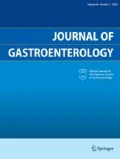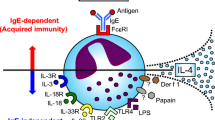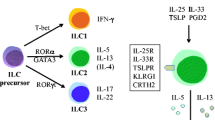Abstract
Background
IgG4-related disease (IRD) is characterized by systemic IgG4 antibody responses and by infiltration of IgG4-expressing plasma cells into the affected organs. Although T helper type 2 (Th2) cytokines are implicated in enhanced IgG4 responses, molecular mechanisms accounting for the development of IgG4 antibody responses are poorly defined. Since basophils function as antigen-presenting cells for Th2 responses, we tried to clarify the role of basophils in the development of IgG4 responses in this study.
Methods
IgG4 and cytokine responses to various nucleotide-binding oligomerization domain-like receptor and Toll-like receptor (TLR) ligands were examined by using basophils isolated from healthy controls and from patients with IgG4-related disease.
Results
Activation of TLRs in basophils from healthy controls induced IgG4 production by B cells, which effect was associated with enhanced production of B cell activating factor (BAFF) and IL-13. In addition, activation of TLRs in basophils from patients with IRD induced a large amount of IgG4 by B cells from healthy controls. This enhancement of IgG4 production was again associated with BAFF and IL-13.
Conclusions
These data suggest that innate immune responses mediated through TLRs may play a role in the development of IgG4-related disease, in part by production of BAFF from basophils.




Similar content being viewed by others
Abbreviations
- Ab:
-
Antibody
- Ag:
-
Antigen
- AIP:
-
Autoimmune pancreatitis
- APC:
-
Antigen-presenting cell
- BAFF:
-
B cell activating factor
- ELISA:
-
Enzyme-linked immunosorbent assay
- IRD:
-
IgG4-related disease
- LPS:
-
Lipopolysaccharide
- MDP:
-
Muramyl dipeptide
- NOD2:
-
Nucleotide-binding oligomerization domain 2
- NLR:
-
NOD-like receptor
- PAM:
-
Pam3CSK4
- PBMC:
-
Peripheral blood mononuclear cell
- PGN:
-
Peptidoglycan
- TLR:
-
Toll-like receptor
- TSLP:
-
Thymic stromal lymphopoietin
References
Okazaki K, Kawa S, Kamisawa T, et al. Japanese clinical guidelines for autoimmune pancreatitis. Pancreas. 2009;38:849–66.
Masaki Y, Dong L, Kurose N, et al. Proposal for a new clinical entity, IgG4-positive multiorgan lymphoproliferative syndrome: analysis of 64 cases of IgG4-related disorders. Ann Rheum Dis. 2009;68:1310–5.
Ravi K, Chari ST, Vege SS, et al. Inflammatory bowel disease in the setting of autoimmune pancreatitis. Inflamm Bowel Dis. 2009;15:1326–30.
Strober W, Murray PJ, Kitani A, et al. Signalling pathways and molecular interactions of NOD1 and NOD2. Nat Rev Immunol. 2006;6:9–20.
Watanabe T, Yamashita K, Fujikawa S, et al. Activation of Toll-like receptors and NOD-like receptors is involved in enhanced IgG4 responses in autoimmune pancreatitis. Arthritis Rheum. 2012;64:914–24.
Jeannin P, Lecoanet S, Delneste Y, et al. IgE versus IgG4 production can be differentially regulated by IL-10. J Immunol. 1998;160:3555–61.
Sokol CL, Medzhitov R. Role of basophils in the initiation of Th2 responses. Curr Opin Immunol. 2010;22:73–7.
Paul WE, Zhu J. How are T(H)2-type immune responses initiated and amplified? Nat Rev Immunol. 2010;10:225–35.
Chen K, Xu W, Wilson M, et al. Immunoglobulin D enhances immune surveillance by activating antimicrobial, proinflammatory and B cell-stimulating programs in basophils. Nat Immunol. 2009;10:889–98.
Phillips C, Coward WR, Pritchard DI, et al. Basophils express a type 2 cytokine profile on exposure to proteases from helminths and house dust mites. J Leukoc Biol. 2003;73:165–71.
Bieneman AP, Chichester KL, Chen YH, et al. Toll-like receptor 2 ligands activate human basophils for both IgE-dependent and IgE-independent secretion. J Allergy Clin Immunol. 2005;115:295–301.
Yamanishi H, Kumagi T, Yokota T, et al. Clinical significance of B cell-activating factor in autoimmune pancreatitis. Pancreas. 2011;40:840–5.
Siracusa MC, Saenz SA, Hill DA, et al. TSLP promotes interleukin-3-independent basophil haematopoiesis and type 2 inflammation. Nature. 2011;477:229–33.
Watanabe T, Katsukura H, Shirai Y, et al. Helper CD4+ T cells for IgE response to a dietary antigen develop in the liver. J Allergy Clin Immunol. 2003;111:1375–85.
Strober W, Fuss I, Mannon P. The fundamental basis of inflammatory bowel disease. J Clin Invest. 2007;117:514–21.
Sah RP, Chari ST, Pannala R, et al. Differences in clinical profile and relapse rate of type 1 versus type 2 autoimmune pancreatitis. Gastroenterology 2010;139:140–8 (quiz e12–3).
Acknowledgments
This work is supported in part by grants from the Ministry of Education, Science and Culture, Japan, and the Japan Society for the Promotion of Science (21590532); Takeda Science Foundation; Astellas Foundation for Research on Metabolic Disorders; Yakult Bioscience Foundation; Cell Science Research Foundation; Kato Memorial Trust for Nambyo Research; Pancreas Research Foundation of Japan; Uehara Memorial Foundation (to T. W.); and Health and Labour Sciences Research Grants for research on intractable diseases from the Ministry of Health, Labour and Welfare of Japan (to T. C.).
Conflict of interest
The authors have declared no conflicts of interest.
Author information
Authors and Affiliations
Corresponding author
Rights and permissions
About this article
Cite this article
Watanabe, T., Yamashita, K., Sakurai, T. et al. Toll-like receptor activation in basophils contributes to the development of IgG4-related disease. J Gastroenterol 48, 247–253 (2013). https://doi.org/10.1007/s00535-012-0626-8
Received:
Accepted:
Published:
Issue Date:
DOI: https://doi.org/10.1007/s00535-012-0626-8




